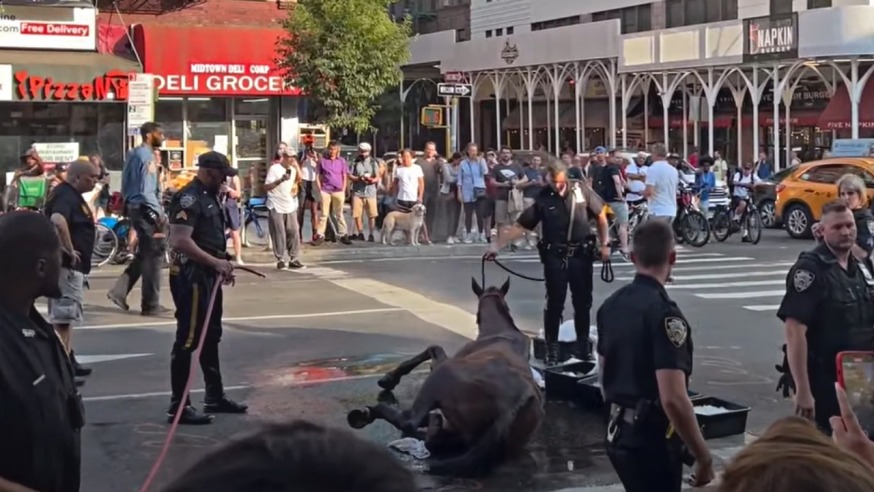
A mistreated carriage horse that collapsed while lugging a wagon over the summer has died and Queens Councilmember Robert Holden has reiterated his calls for the practice to be outlawed (Photos: Twitter and Instagram)
Oct. 17, 2022 By Michael Dorgan
A mistreated carriage horse that collapsed while lugging a wagon during the summer heat has died — and Queens Councilmember Robert Holden has reiterated his calls for the practice to be outlawed.
The carriage horse, called Ryder, became a rallying call for animal rights activists after it was seen falling to its knees on a Manhattan street on Aug. 10. Ryder then collapsed on its side as its rider pulled its reins and shouted, “get up, get up.”
Videos of the Aug. 10 incident went viral and sparked widespread condemnation. Ryder was eventually doused in cold water and helped to his feet around an hour later by the NYPD. The horse was eventually brought to a farm and retired.
The animal rights group New Yorkers for Clean, Livable, and Safe Streets (NYCLASS) announced Monday that Ryder had died. The organization did not provide an exact cause of death and stated Ryder had been transported to Cornell for a necropsy, the animal equivalent of an autopsy.
“Make no mistake: this tragedy was not caused by an act of God – Ryder’s death was the result of savage cruelty and greed,” Edita Birnkrant, the executive director of NYCLASS, said in a statement.
Holden said that he was saddened, but not surprised to hear of the horse’s passing.
“There was no reason for this poor, elderly horse to be intentionally worked to death on the streets of Manhattan,” Holden said in a statement.
“Ryder will always be a symbol of the carriage industry’s cruelty and dishonesty.”

Ryder was eventually doused in cold water and helped to his feet around an hour later by the NYPD (Photo: Screenshot)
View this post on Instagram
Holden also said that Ryder was much older than its owner Ian McKeever had claimed.
McKeever told NYPD officers after the Aug. 10 incident that Ryder was 13. However, an industry veterinarian determined that the horse was 28-30 years old, according to the official police report obtained by the New York Post.
The report also stated that Ryder was malnourished, underweight and suffered from the equine neurological disorder EPM (Equine Protozoal Myeloencephalitis).
Holden repeated calls for the passage of his legislation that would ban horse-drawn carriages.
The legislation, introduced in July, would end the practice beginning June 1, 2024, and replace the wagons with horseless electric carriages that would provide trips within Central Park and certain areas of Manhattan.
Under the legislation, the city would oversee a program to lease or sell the electric carriages to current horse-drawn cab drivers who would get preference for licenses to operate the new vehicles. The new electric carriage drivers would also be paid prevailing or union wages set by the city comptroller.
“[Ryder’s] death must not be for nothing, we can still save the other carriage horses,” Holden said in a statement. “This barbaric animal abuse needs to stop.”
Horse-drawn carriages, although controversial due to animal welfare concerns, have been a Central Park fixture since the 1850s and continue to be a massive tourist attraction, proponents say.
However, Holden said that his bill has widespread support, citing a poll that found that 71 percent of New Yorkers are in favor of a ban.
The poll was commissioned by the Animal Legal Defense Fund and Voters for Animal Rights, a Brooklyn-based animal rights group. The poll was conducted online by John Zogby Strategies on Aug. 24, nearly two weeks after Ryder gained headlines following his collapse.






